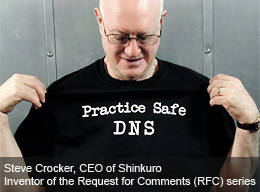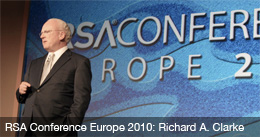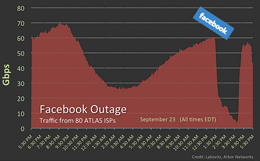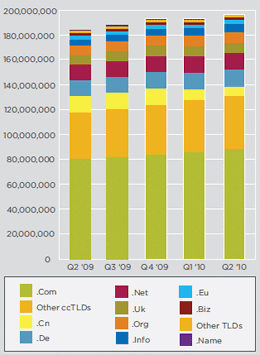

 .ORG, The Public Interest Registry (PIR) has announced today the launch of a new campaign aimed at educating IT professionals about securing DNS and the adoption of Domain Name System Security Extensions (DNSSEC). The key purpose of the "Practice Safe DNS" website, according to PIR, is to "serve as a key resource for domain holders, registrars, web developers and IT professionals to learn how they can respectively play a increasingly relevant role in providing a safer and more secure Internet." more
.ORG, The Public Interest Registry (PIR) has announced today the launch of a new campaign aimed at educating IT professionals about securing DNS and the adoption of Domain Name System Security Extensions (DNSSEC). The key purpose of the "Practice Safe DNS" website, according to PIR, is to "serve as a key resource for domain holders, registrars, web developers and IT professionals to learn how they can respectively play a increasingly relevant role in providing a safer and more secure Internet." more
The Number Resource Organization (NRO) announced today that less than five percent of the world's IPv4 addresses remain unallocated. APNIC, the Regional Internet Registry for the Asia Pacific region, has been assigned two blocks of IPv4 addresses by the Internet Assigned Numbers Authority (IANA). This latest allocation means that the IPv4 free pool dipped below 10% in January, just nine months ago. Since then, over 200 million IPv4 addresses have been allocated from IANA to the Regional Internet Registries (RIRs). more
Internet Corporation for Assigned Names and Numbers (ICANN) announced today its approval of non-Latin string evaluation of Iran. This approval will allow the availability of Iran's top-level domain in its own native language, Persian, also known as Farsi (that is, the domain name .IRAN, in non-Latin characters). According to ICANN, there are currently 33 requests for Internationalized Domain Names (IDN) country code Top-Level Domains (ccTLDs) representing 22 languages out of which 18 countries/territories have so far been approved. Other countries that have also successfully passed this string evaluation by ICANN include: India, Republic of Korea, Syrian Arab Republic and Singapore. more
 In his keynote yesterday at the RSA Security Conference, former U.S. top chief counter-terrorism adviser, Richard A. Clarke, said cyberwar defence efforts need to focus on re-architecting networks not buying more technology. more
In his keynote yesterday at the RSA Security Conference, former U.S. top chief counter-terrorism adviser, Richard A. Clarke, said cyberwar defence efforts need to focus on re-architecting networks not buying more technology. more
Paul Budde writes: "Two relatively new mobile market entrants, Mobyland and Centernet, have launched Poland and Eastern Europe's first commercial LTE network. Vendor Huawei provided the equipment for the network, which operates in the 1800MHz frequency band. Both Mobyland and Centernet previously offered GSM services in the frequency band before refarming the spectrum to offer LTE. The operators aim to expand coverage to 20% of the population by 2011 by deploying 700 base stations." more
Dutch sources are reporting that OPTA, the dutch telecommunications authority, has asked more than a dozen hotels to register as Internet service providers. The move has frustrated the Hospitality Association... more
The one-page link shortening service provider, vb.ly, has been seized with no apparent warning by the Libyan government which manages the ".ly" county code Top-Level Domain (ccTLD). According to reports, Nic.ly, the registry operator of the ccTLD in Libya informed the user of the domain that the content of its website was considered offensive, obscene and illegal by the Libyan Islamic Sharia Law and therefore revoked. more
A recent study released today suggests 53 percent of critical infrastructure providers have experienced what they perceived as politically motivated cyber attacks. According to Symantec's 2010 Critical Information Infrastructure Protection (CIP) Survey, participants claimed to have experienced such an attack on an average of 10 times in the past five years, incurring an average cost of $850,000 during a period of five years to their businesses. more
The National Telecommunications and Information Administration (NTIA) is hosting a workshop today discussing the state of IPv6 in the U.S. and its impact on the industry, government, and the Internet economy. The moderators for the workshop are Aneesh Chopra, Chief Technology Officer of the United States and Vivek Kundra, Chief Information Officer of the United States. Participants include... more
 Craig Labovitz reporting from Arbor Networks: "We use ATLAS data to graph Facebook (AS32934) traffic with 80 ISPs around the world between 5pm September 22 and 5pm EDT today. You can see Facebook traffic plummet around 1:30pm and return shortly after 4pm. From a quick glance at the data, the outage appears to be global (impacting most of the 80 ISPs)." more
Craig Labovitz reporting from Arbor Networks: "We use ATLAS data to graph Facebook (AS32934) traffic with 80 ISPs around the world between 5pm September 22 and 5pm EDT today. You can see Facebook traffic plummet around 1:30pm and return shortly after 4pm. From a quick glance at the data, the outage appears to be global (impacting most of the 80 ISPs)." more
Majority of U.S. Federal agencies using .gov domains have not signed their DNS with DNSSEC (Domain Name Security Extensions) despite a December 2009 Federal deadline for adoption, according to the latest report by IID (Internet Identity). IID analyzed the DNS of more than 2,900 .gov domains and has released the results in its "Q3 State of DNS Report". more
In a unanimous vote today, the FCC has given a green light for the use of "white spaces" in order to deliver broadband connections as super "WiFi". From today's announcement: "The Federal Communications Commission today took steps to free up vacant airwaves between TV channels -- called "white spaces" -- to unleash a host of new technologies, such as "super Wi-Fi," and myriad other diverse applications. This is the first significant block of spectrum made available for unlicensed use in more than 20 years. TV white space spectrum is considered prime real estate because its signals travel well, making it ideally suited for mobile wireless devices." more
Larry Seltzer writes: Politico? Comcast's PR gets an 'A' for this article, an upbeat tech-lite description of the impending depletion of the IPv4 space and efforts to adopt IPv6. It also seems that the Obama administration is behind this, and that the Federal government has had "remarkable foresight on this issue." I feel better already. more
 ITU Secretary-General, Dr. Hamadoun Touré, has challenged global leaders to ensure that more than half of all the world's people have access to broadband networks by 2015, and make access to high-speed networks a basic civil right. "Broadband will be a game-changer in addressing rising healthcare costs, delivering digital education, empowering marginalized communities, and mitigating climate change." more
ITU Secretary-General, Dr. Hamadoun Touré, has challenged global leaders to ensure that more than half of all the world's people have access to broadband networks by 2015, and make access to high-speed networks a basic civil right. "Broadband will be a game-changer in addressing rising healthcare costs, delivering digital education, empowering marginalized communities, and mitigating climate change." more
 The global base of domain names grew by more than 3 million in the second quarter of 2010, according to the latest Domain Name Industry Brief, published by VeriSign, Inc. According to the report, the domain name industry ended the second quarter of 2010 with a base of more than 196.3 million domain name registrations across all of the Top-Level Domain Names (TLDs). The combined base of .com and .net domain names surpassed 100 million, finishing the quarter with an adjusted zone size of 101.5 million. New .com and .net registrations totaled 7.9 million during the second quarter, an increase of 13 percent from a year ago. more
The global base of domain names grew by more than 3 million in the second quarter of 2010, according to the latest Domain Name Industry Brief, published by VeriSign, Inc. According to the report, the domain name industry ended the second quarter of 2010 with a base of more than 196.3 million domain name registrations across all of the Top-Level Domain Names (TLDs). The combined base of .com and .net domain names surpassed 100 million, finishing the quarter with an adjusted zone size of 101.5 million. New .com and .net registrations totaled 7.9 million during the second quarter, an increase of 13 percent from a year ago. more
Sponsored byVerisign

Sponsored byRadix

Sponsored byIPv4.Global

Sponsored byWhoisXML API

Sponsored byVerisign

Sponsored byDNIB.com

Sponsored byCSC
